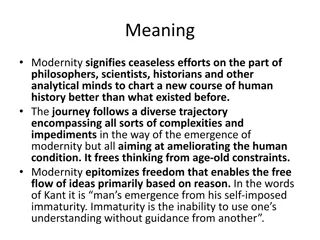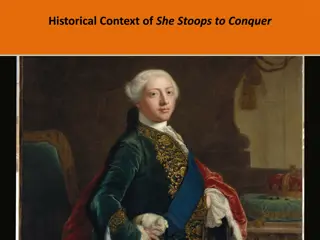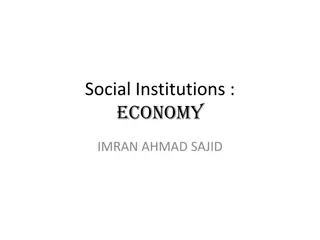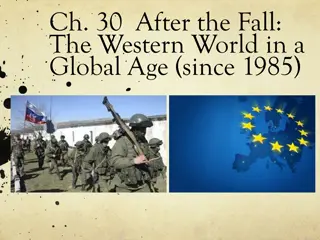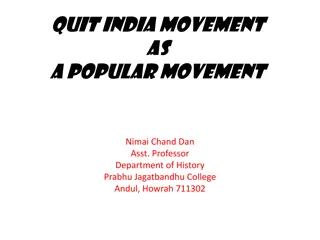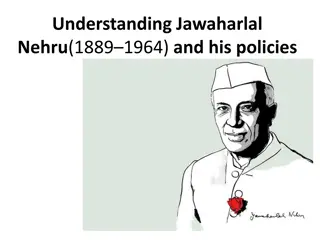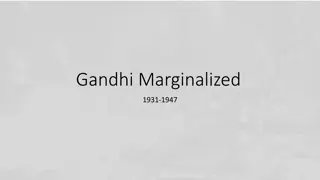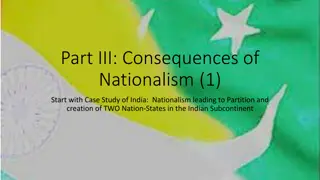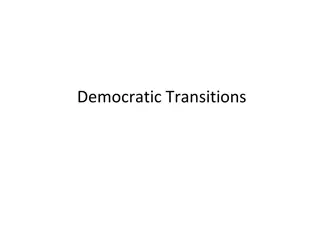The All India Hindu Mahasabha: History and Impact
The All India Hindu Mahasabha is a right-wing Hindu nationalist political party in India formed to protect Hindu community rights. Despite being old, it has had marginal influence on politics. The Mahasabha emphasized Hindu solidarity and social reform, founded in the early 1900s by leaders like Pan
2 views • 11 slides
The Shifting of India's Capital: The Story of New Delhi
The decision to move the capital of India from Calcutta to Delhi in 1911 led to the creation of Imperial Delhi, now known as New Delhi. This move was a reflection of British colonial rule in India, marked by controversies, cost overruns, and disagreements among architects. The shift was influenced b
1 views • 19 slides
Evolution of Industrial Revolutions Towards Industry 4.0
Key Enabling Technologies (KET) play a crucial role in revitalizing production systems by fostering technological advancements through research experiences. Industry 4.0 signifies a transformative phase with new technologies, production factors, and work structures reshaping the manufacturing landsc
13 views • 60 slides
Evolution of Modern Drama in English Literature: A Comprehensive Overview
Modern drama in English literature evolved through different phases from the late 19th to the mid-20th century, showcasing innovative techniques and themes. The revival of drama in the 20th century brought forth various trends and currents, reflecting social issues and nationalistic sentiments. This
0 views • 7 slides
Evolution of Technologies: A Journey Through Revolutions
Explore the evolution of technologies through different revolutions - from the agricultural revolution to the emerging technologies of the future. Learn about the profound changes in economic relationships and technological conditions that have shaped human society. Discover the role of data, progra
0 views • 58 slides
Evolution of Medicine in Colonial South Asia
The evolution of medicine in colonial South Asia witnessed a transition from local traditional practices to the dominance of imported European medicine. This shift, marked by the establishment of imperial institutions and training of local physicians in Western techniques, led to a complex interplay
1 views • 5 slides
Understanding the Basic Concept of Human Rights in Modern Jurisprudence
Human rights are natural and inalienable, essential for human life, based on universal principles. The concept of human rights is both simple and complex, requiring societal development and political will for implementation. Rooted in natural law theory, human rights have evolved from natural law to
1 views • 24 slides
Objectivity, Value Judgement, and Theory Choice in Science
Thomas Kuhn's work explores the subjective elements in theory choice, highlighting that theory selection is not solely based on objective algorithms. He discusses the structure of scientific revolutions, where science shifts between normal and revolutionary phases. Kuhn's ideas have faced criticisms
6 views • 19 slides
Exploring the Significance and Origin of Modernity
Modernity embodies the relentless pursuit of progress in human history, driven by freedom, reason, and the desire to improve the human condition. It traces back to the European enlightenment of the 18th century and is associated with philosophical, scientific, and social revolutions. The concept of
0 views • 19 slides
Historical Context of "She Stoops to Conquer" During King George III's Reign
The play "She Stoops to Conquer" is set during King George III's reign, a period of significant social change in Britain. The Agricultural and Industrial Revolutions were transforming the country, leading to urbanization and class divisions. The interactions between city-dwellers and country folk in
0 views • 7 slides
Exploring the Vibrant Era of the Swinging Sixties
Delve into the dynamic decade of the Swinging Sixties, a period marked by cultural revolutions, iconic figures like Martin Luther King Jr. and President John F. Kennedy, and significant events that shaped history. Discover the socio-economic landscape, key individuals, and pivotal moments that defin
0 views • 25 slides
Evolution of State Formation and Nation-Building: A Historical Perspective
Explore the intricate evolution of state formation and nation-building throughout history, examining various patterns and phases from the origins of the state to the emergence of nationhood. Delve into the critical intersections between state institutions, nation-building processes, and the idea of
0 views • 17 slides
Evolution of Economic Institutions Through Technological Revolutions
Economies of modern nations have evolved over centuries through technological revolutions. The Agricultural Revolution led to the creation of a distinct economy with surplus production, job specialization, and trade. The Industrial Revolution further transformed production, leading to significant in
1 views • 35 slides
Study Design for Units 3 and 4 Revolutions 2022-26 Workshop
Explore the study design and implementation for Units 3 and 4 Revolutions focusing on key areas like causes and consequences of revolutions in countries such as Russia, China, America, and France. The workshop emphasizes acknowledgment of traditional custodians and offers teaching ideas, questions f
0 views • 29 slides
Impact of the Indian Council Act of 1892 on Indian Nationalism
The Indian Council Act of 1892 was a significant step towards representative government in colonial India, increasing Indian representation in legislative councils. While it did not fully meet nationalist demands, it indirectly fueled revolutionary movements and calls for a more aggressive anti-Brit
0 views • 18 slides
Evolution of Industrial Revolutions in Agriculture: Free State Province Research & Program Director's Plannery Session
The presentation delves into the alignment of agriculture with the Fourth Industrial Revolution (4IR) in the Free State Province, tracing the evolution from the first to the third industrial revolutions. It discusses the advantages, disadvantages, impacts, competitiveness, opportunities, and threats
0 views • 31 slides
The Fall of the Soviet Union: Gorbachev's Reforms and Global Impact
In the late 20th century, the collapse of the Soviet Union under Gorbachev's leadership ushered in a new era of economic, political, and social change. Gorbachev's policies of glasnost and perestroika opened up Soviet society, leading to nationalist movements and ultimately the dissolution of the US
0 views • 12 slides
Overview of Quit India Movement and its Phases
The Quit India Movement was a significant event in India's struggle for independence, marked by various factors leading to its emergence, including the demise of the Civil Disobedience Movement and the rise of nationalist sentiments. The movement escalated in response to the outbreak of World War II
1 views • 9 slides
Jawaharlal Nehru: Visionary Leader and Architect of Modern India
Jawaharlal Nehru, a prominent leader of India's nationalist movement, played a crucial role in shaping the country's policies post-independence. As India's first Prime Minister, he focused on pillars like democracy, socialism, secularism, and nationalist unity. Nehru's domestic policies emphasized s
0 views • 8 slides
Gandhi's Marginalization in Indian Nationalist Politics from 1931-1947
The 1930 Salt Satyagraha propelled Gandhi into the heart of nationalist politics, challenging colonial rule. However, by the end of the decade, the tide shifted away from his influence towards a more conventional political landscape dominated by power negotiations and elections, leading to Gandhi's
4 views • 11 slides
Latin American Revolutions: Causes, Events, and Impact
Latin American Revolutions from 1791 to 1825 marked a period of significant upheaval as colonies in the Western Hemisphere sought independence from Spanish rule. Driven by factors like inspired by other successful revolutions, Spanish mercantilist policies, and unequal wealth distribution, these rev
1 views • 12 slides
The Berlin Revolutions of 1848: A Historic Perspective
The Berlin Revolutions of 1848 were part of a series of widespread uprisings across Europe, driven by a mix of liberal and working-class goals. The revolutions aimed to challenge the existing autocratic political structure in the German Confederation and the Austrian Empire. Despite initial hopes fo
1 views • 14 slides
Two Revolutions in Russia: The March and November Revolutions of 1917
The year 1917 witnessed two significant revolutions in Russia - the March Revolution leading to the abdication of the Tsar and the formation of the Provisional Government, followed by the November Revolution where Lenin's Bolsheviks overthrew the Provisional Government and established the world's fi
0 views • 20 slides
Understanding Colonialism and Imperialism in Modern History
The discussion revolves around the impact of colonialism and imperialism on international relations, focusing on the historical context, economic consequences, and nationalist movements against colonial powers. Highlighting key players such as Great Britain, France, and Germany during the 19th centu
2 views • 14 slides
Understanding Nationalism in Political Science
Nationalism, a complex concept, defines the nation as the fundamental unit of political rule. It encompasses a mix of objective and subjective factors, including cultural, ethnic, and political traits. The definition of a nation is subjective, based on how its members perceive themselves as a distin
0 views • 27 slides
A Comparative Analysis of the American and French Revolutions
The American and French Revolutions were significant events during the late 18th century. Both revolutions were driven by Enlightenment ideals, concern for liberty, and push for new governance but had differences in violence, outcomes, and influence. While the American Revolution led to independence
0 views • 9 slides
Unveiling Historical Contexts of Lagaan and Cricket in Colonial India
Explore the intricate historical contexts of the film "Lagaan" and the sport of cricket in colonial India. Delve into the political history, princely India dynamics, class, caste, region, religion complexities, and the economic significance in the British Empire's rule. Unveil the interplay of racis
0 views • 6 slides
History of Scouting and Guiding in India
The history of Scouting and Guiding in India dates back to 1909 when the first Scout Troop was established by Captain T.H. Baker in Bangalore. Over the years, the movement grew and efforts were made to include Indian boys. Nationalist leaders played a key role in promoting Scouting activities among
0 views • 35 slides
Unification of Italy in the 19th Century: Risorgimento Movement
The Unification of Italy in the 19th Century was driven by the Risorgimento nationalist movement, led by figures like Giuseppe Mazzini, Camillo Benso di Cavour, and Giuseppe Garibaldi. Cavour, as Chief Minister of Sardinia, played a crucial role in reorganizing the army and forming alliances to defe
1 views • 25 slides
Cases of Hate Speech in Public and Student Speech Scenarios
The content discusses instances of hate speech in two different scenarios. In the public employee speech case, a building inspector's tweets lead to his firing and subsequent legal action. In the student speech case, a high school junior's involvement in a white nationalist demonstration causes disr
0 views • 16 slides
Challenges to Religious Freedom in India: An Overview
India, as the world's largest democracy with a tradition of secularism, faces escalating challenges to religious freedom and civil society. The BJP-led government's Hindu nationalist agenda has led to systematic violations of religious rights, targeting minorities and activists. The tightening grip
0 views • 20 slides
Nationalist Revolutions in Latin America: 1789-1900
Rising nationalism in Latin America during the late 1700s and early 1800s led to revolutions against European colonial powers. Inspired by Enlightenment ideals and events such as the American and French Revolutions, Latin Americans sought self-government and independence. The Haitian Revolution in 1
1 views • 28 slides
The United States Imperialism in East Asia: The Filipino Rebellion
The United States' decision to keep the Philippines as a territory sparked a rebellion led by Filipino nationalist leader Emilio Aguinaldo, who initially believed the US was an ally in the fight for independence. However, disillusionment led to an insurrection against US rule, with Filipino insurgen
0 views • 16 slides
Impact of Gandhi's Satyagraha on British India's Independence Struggle
Gandhi's principles of Satyagraha, emphasizing civil disobedience and non-violence, played a crucial role in India's fight for independence from British colonial rule. His leadership and methods such as boycotts and peaceful protests garnered international support, pressuring the British government
0 views • 18 slides
Chinese Nationalist Revolution: Prelude to Internal Tensions and Imperialism Redux
Prelude to the Chinese Nationalist Revolution explores the backdrop of internal tensions and Imperialism in China from 1895 to the early 1900s. The period witnessed a series of revolts against Manchu authority, including the Taiping Rebellion and self-strengthening efforts to adopt Western technolog
0 views • 30 slides
The Marginalization of Gandhi in India's Nationalist Movement
Explore how Gandhi's approach to nationalism in India, focusing on inclusive mass movements and power-sharing, led to his marginalization within the nationalist discourse, ultimately influencing the partition and creation of India and Pakistan as separate nation-states. Despite his significant role,
0 views • 13 slides
Frantz Fanon: Unveiling Algeria and Transforming Gender Dynamics
Frantz Fanon, a psychiatrist, revolutionary, and theorist, delves into the complexities of Algerian society, particularly focusing on the significance of the veil as a signifier of Arab women and their societal roles. He explores the historical evolution of the veil in Algeria, challenging colonial
0 views • 20 slides
Overview of Democratic Transitions and Revolutions
Explore the historical context of democratic transitions from the 1940s to 2020, including the waves of democracy as described by Huntington. Learn about bottom-up and top-down transitions, exemplified by mass protests in East Germany leading to German reunification. Delve into the complexities of p
0 views • 73 slides
Europe from French Revolution to Revolutions of 1848
From the French Revolution to the early nineteenth century, Europe saw significant political changes, including the rise of Napoleon Bonaparte, the Congress of Vienna in 1815, and subsequent revolutions like the 1830 French Revolution and the Revolutions of 1848 that spread across Europe, shaping th
0 views • 6 slides
The Rise of Fascism in Europe During the Interwar Years
Post-World War I, Europe faced economic turmoil leading to the rise of fascism, particularly in Italy under Mussolini. Fascism, a nationalist ideology, promoted authoritarian rule, suppression of opposition, and militaristic foreign policies. This extreme system attracted support due to promises of
0 views • 54 slides








